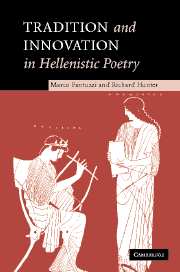Book contents
- Frontmatter
- Contents
- Preface
- List of abbreviations
- 1 Performance and genre
- 2 The aetiology of Callimachus' Aitia
- 3 The Argonautica of Apollonius and epic tradition
- 4 Theocritus and the bucolic genre
- 5 Epic in a minor key
- 6 The style of Hellenistic epic
- 7 The epigram
- 8 The languages of praise
- 9 Hellenistic drama
- 10 Roman epilogue
- Bibliography
- Index of passages discussed
- General index
6 - The style of Hellenistic epic
Published online by Cambridge University Press: 22 September 2009
- Frontmatter
- Contents
- Preface
- List of abbreviations
- 1 Performance and genre
- 2 The aetiology of Callimachus' Aitia
- 3 The Argonautica of Apollonius and epic tradition
- 4 Theocritus and the bucolic genre
- 5 Epic in a minor key
- 6 The style of Hellenistic epic
- 7 The epigram
- 8 The languages of praise
- 9 Hellenistic drama
- 10 Roman epilogue
- Bibliography
- Index of passages discussed
- General index
Summary
INTRODUCTION
One of the protagonists of the Phoenicides of Straton, a Middle Comedy poet of the second half of the fourth century, had a terrible experience one day with a cook whom he had hired (Straton, PCG 1). The cook did not speak like normal people, but expressed himself in Homeric language, with the result that when he asked his employer how many people he had invited to dinner, he did not use the everyday Greek words for ‘men’, such as ἄνθρωποι or ἄνδρες, but the rare epic-archaic (and occasionally also tragic) term μέροπες, whose etymology was as obscure for the ancients as it is for us; for the ‘guests’, he used the rare word δαιτυμόνες ‘those who receive/bring their portion’. His confused employer could only interpret these as proper names. So too, when he asked the cook about dinner, the cook reeled off another list of rare glosses or Homeric words (μῆλα for ‘sheep’, οὐλοχύται for ‘barley, etc.), together with a few (to us) new forms, perhaps borrowed from some post-Homeric epic. Thus, an ox became ῥηξίχθονα … εὐρυμέτωπον ‘wide-browed […] soil-breaker’ (vv. 20–1), in which the second epithet is Homeric, whereas the first, though analogous in structure to the second, appears here for the first time, perhaps as a virtuoso novelty of the erudite cook.
- Type
- Chapter
- Information
- Tradition and Innovation in Hellenistic Poetry , pp. 246 - 282Publisher: Cambridge University PressPrint publication year: 2005



